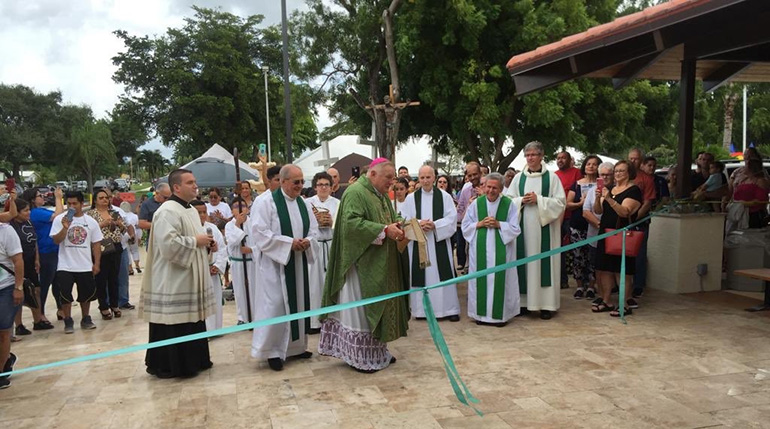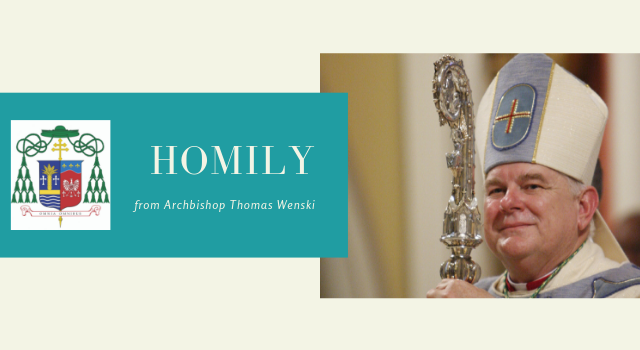By Archbishop Thomas Wenski - The Archdiocese of Miami

Photographer: Via Twitter @thomaswenski
After celebrating a multilingual Mass (Spanish, Brazilian Portuguese, and English) Oct. 20 at St. Vincent Church in Margate, Archbishop Thomas Wenski blesses a new pavilion at the parish.
Archbishop Thomas Wenski preached this homily while celebrating Mass at St. Vincent Parish in Margate Oct. 20, 2019, 29th Sunday in Ordinary Time.
In the Gospel parable we have just heard, Jesus is not comparing God to the unjust judge. He is not suggesting that God is like that cranky old judge and only answers prayers to avoid being bothered further. Jesus is not comparing God to this unjust judge, he contrasts God with the judge. If this unjust judge can eventually do justice by this poor widow, how much more will God, who is just, answer those who pray to him?
At any rate, God wants us to pray – and not just once in a while. In fact, St. Paul tells us to “pray always.” And that’s the point of today’s parable. It’s not about the attitude of the unjust judge but about the attitude of the poor widow. Prayer and perseverance in prayer are for our sake – not for God’s sake. Perseverance allows us to marshal enough power and to gather enough inner resources in order to win the victory in the battle against all that would diminish us as men and women.
This is likewise the point of the first reading from the Book of Exodus and second reading from St. Paul’s letter to Timothy in today’s Mass. For it is the effort of Moses that allows his people to gather strength and to marshal their resources against the evil that is assaulting them, and it is the continued and persevering effort, without quitting, that allows us to take hold of the willingness of God and His power in order to put it to use in our lives. The same is true with the widow in her continual pleas for justice. The same ought to be true for you and me.
God will not transform our world for us. God is not a great big magic genie who responds to our every little beck and call. To think of God in those terms is to believe that God exists to serve us, and not we to serve God.
Deus não é um grande gênio mágico que responde a todos os nossos pequenos conselhos. Pensar em Deus nesses termos é acreditar que Deus existe para nos servir, e não nós para servir a Deus.
En el evangelio de hoy Jesús no está diciendo que Dios es como ese juez injusto, sino nos dice que debemos ser como esa pobre viuda que supo pedir con insistencia. Dios no es un gran mago que responde a nuestros caprichos. Pensar en Dios en esos términos es creer que Dios existe para servirnos, y no nosotros para servir a Dios. La oración y la perseverancia en la oración no son por el bien de Dios sino por nuestro bien.
You and I know that we are dealing with gigantic forces of evil in our world. We see it in how cheaply life is regarded. We see it in the poverty that afflicts so many. We see it in terrorism that frightens us all, in racial and ethnic strife, in the break-up of the family. We see it in the relativism that has infected our culture.
But God will not transform our world for us; but he will transform our world with us. His interventions into our life occur only through us, and with us, and in us, when we yield to His Holy Spirit, surrender to His presence, and take a hold of and claim His power. We can’t make peace, we can’t make a more just society, and we can’t change our spouses or our kids like we can make instant coffee. That takes sustained and persevering effort.
Of course, we will often fail. We are all less than what we strive to be. But the answer to failure is not resignation; it is not settling for second best, or third best. The answer is to recognize that Christ is down in the dust with us. He fell more than once along the Way of the Cross. And so, the answer is not to allow ourselves to be ground down by mediocrity but to keep working at it. God will work with us; but he won’t work without us.
When the Son of Man comes into our lives, when Christ comes to us in all the tomorrows that lie ahead, what will He find? Will he find us copping out? – escaping from responsibility into selfishness, in disordered sexual pleasure, in drugs, in violence, in indifference or cynical attitudes? Or will he find persons with faithfulness, persons who are persevering, steady, dependable, and filled with a sustaining power – persons who are about our Father’s business in overcoming the forces of dissipation and diminishment that afflict us?
E então, ouça o que a Palavra de Deus está nos dizendo hoje. Deus está sempre disposto a responder às nossas orações – mas ele o faz nos seus termos, não nos nossos. De nossa parte, devemos orar sempre e orar com confiança e perseverança. Foi assim que Moisés orou com os braços estendidos erguidos por seus assistentes. Foi assim que Jesus orou – com os braços estendidos na cruz.
Jesús nos habla de la necesidad de rezar siempre – y con insistencia y confianza. Como un marinero en un bote que intenta atracarlo en el muelle. Lanza una línea para atarla al muelle, y luego tira de la línea. El muelle no se mueve, el bote sí. Y, si las aguas son agitadas, puede que tenga que tirar muy fuerte de esa línea y puede tomar más de un intento. A eso se refiere Jesús al hablarnos de la oración perseverante. No se trata de acercar a Dios a nosotros, se trata de acercarnos a Dios. Nuestras oraciones no se ofrecen para cambiar a Dios, y, ¿por qué? Él es bueno y todo amor. La oración se trata de cambiarnos, y para que nosotros cambiemos, esto si requiere mucha perseverancia.
And so, listen to what the Word of God is telling us today. God is always willing to answer our prayers – but he does so on his terms not on ours. On our part, we must pray always, and pray with confidence and with perseverance. That’s how Moses prayed with outstretched arms held up by his assistants. That’s how Jesus prayed – with his arms outstretched on the cross.
Prayer is like a man in a boat who is trying to dock it at the pier. He tosses out a line to be tied to the pier – and then he pulls on the line. The pier doesn’t move, the boat does. And, if the waters are rough, he may have to pull on that line very hard and it may take him more than one try. That’s what Jesus means about persevering prayer. It’s not about pulling God closer to us, it’s about pulling ourselves closer to God. Our prayers are not supposed to change God – because he is good and all loving. Prayer is about changing us – and for us to really change does require no little perseverance.

